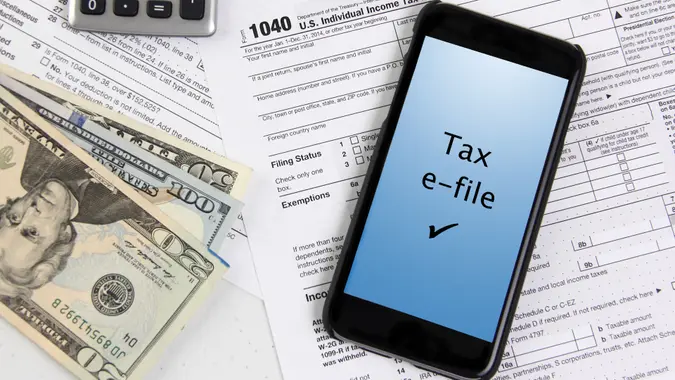6 Ways To Lower Your Tax Bill Now and in the Future

Commitment to Our Readers
GOBankingRates' editorial team is committed to bringing you unbiased reviews and information. We use data-driven methodologies to evaluate financial products and services - our reviews and ratings are not influenced by advertisers. You can read more about our editorial guidelines and our products and services review methodology.

20 Years
Helping You Live Richer

Reviewed
by Experts

Trusted by
Millions of Readers
Tax season is here but you can still make a few adjustments that can have a significant impact on how much you pay in taxes.
Taxes aren’t based on your gross annual income but instead are applied to your adjusted gross income (AGI) minus either the standard deduction or allowable itemized deductions, according to the Tax Policy Center. By lowering your AGI, you can reduce your taxable income for the year.
Some of these tips will help with your current taxes, while some will work on future taxes. Here are six strategies to help cut your tax bill today and in the future.
Contribute To a Retirement Account
Contribute to a 401(k) or a traditional IRA. If you’re self-employed and contribute to a SEP IRA, you can contribute up to the lesser of 25% of your net self-employment income or $66,000.
Defer Your Bonus
Expecting a year-end bonus? If this extra income is enough to bump you up into the next tax bracket and increase your taxable income, you can delay this income until the beginning of the new year, TurboTax CPA and tax expert Lisa Greene-Lewis said to USA Today. If your work can delay your December bonus until January 2025, it won’t be considered part of your 2024 income.
Expedite Deductions, Defer Income
There are several deductions that are recognized in the year they’re paid. For example, you can deduct mortgage interest if you own a home, and if you make an extra mortgage payment before the end of the year, you can claim the interest on that payment on your return.
However, if you purchased a home after Dec. 15, 2017, you can only deduct up to $750,000 in total mortgage interest instead of $1,000,000 for homes purchased before then, USA Today noted.
Donate
If you itemize your deductions, you can make a donation to a qualified charitable organization by Dec. 31 every year to potentially reduce your tax bill. Under the CARES Act, you can take advantage of the standard deduction for cash donations of up to $300 made to a 501(c)(3) organization or $600 for married couples filing jointly, Greene-Lewis said.
Sell Losses
An investment that has lost value may help you offset your taxable income using a strategy called tax-loss harvesting. You can sell underperforming investments and if losses exceed your gains, you can potentially offset up to $3,000 of your ordinary income. Any amount over $3,000 can be carried forward to future tax years.
Make Sure You’re Getting Credits and Deductions Right
The tax code offers a variety of credits and deductions that can help lower your overall tax liability for 2024 and beyond. Taking full advantage of these tax breaks is one of the best ways to reduce your tax bill.
For example, if you’re a homeowner, you can deduct the interest paid on your mortgage as well as property taxes, up to set limits. These deductions are valuable whether you take the standard deduction or itemize. The child tax credit provides up to $2,000 in tax savings per child under age 17. (Warning: The credits phase out at higher income levels.) Did you purchase a new electric vehicle in 2023? You may qualify for a tax credit of up to $7,500. There are also credits available for installing an EV charging station. Consulting with a tax professional can help you evaluate which tax breaks apply to your situation.
Laura Beck contributed to the reporting for this article.
More From GOBankingRates
 Written by
Written by  Edited by
Edited by 

























